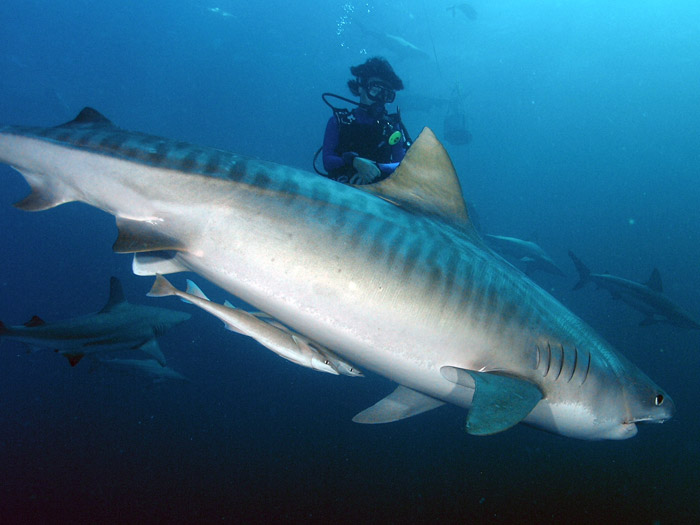Source (google.com.pk)
Information About Tiger Sharks
The tiger shark is the fourth biggest shark in the world and is found in warmer and tropical waters in the Southern Hemisphere. The tiger shark tends to be found in more coastal waters but tigers sharks are also known to go into the deeper ocean if they need to hunt for food.
The tiger shark is a fierce predator and tiger sharks hunt everything in the water including fish, seals, birds, turtles and even other sharks. The tiger shark gets it's name from the black stripes it has when it is young. Most tiger sharks lose these stripes as they get older.
Like most other species of shark, tiger sharks have sensors on the sides of their heads which enable them to detect small muscle movements from nearby creatures. The tiger shark also has a wedge-shaped head which allows the shark to turn quickly when it needs to. Tiger sharks can reach a top speed of around 20mph which is pretty fast in the water!
Tiger sharks are extremely aggressive animals are thought to be one of the most dangerous sharks for humans to come into contact with. Tiger sharks are solitary hunters and usually do most of their hunting at night when the tiger shark can move through the water unseen.
Female tiger sharks mate every three years or so and the time of year when this happens depends on where the tiger shark lives. Tiger sharks in the Northern Hemisphere mate from March to May, where tiger sharks in the Southern Hemisphere mate from November to January. The eggs hatch inside the female tiger shark and can remain inside her for up to 16 months. When they are big enough, the female tiger shark gives birth to between 10 and 80 baby tiger sharks.
Tiger sharks usually range from between 3 to 5 metres in length. Although much larger specimens have been seen, the largest a tiger shark tends to get is around 5.5 metres long.
The tiger shark is the fourth biggest shark in the world and is found in warmer and tropical waters in the Southern Hemisphere. The tiger shark tends to be found in more coastal waters but tigers sharks are also known to go into the deeper ocean if they need to hunt for food.
The tiger shark is a fierce predator and tiger sharks hunt everything in the water including fish, seals, birds, turtles and even other sharks. The tiger shark gets it's name from the black stripes it has when it is young. Most tiger sharks lose these stripes as they get older.
Like most other species of shark, tiger sharks have sensors on the sides of their heads which enable them to detect small muscle movements from nearby creatures. The tiger shark also has a wedge-shaped head which allows the shark to turn quickly when it needs to. Tiger sharks can reach a top speed of around 20mph which is pretty fast in the water!
Tiger sharks are extremely aggressive animals are thought to be one of the most dangerous sharks for humans to come into contact with. Tiger sharks are solitary hunters and usually do most of their hunting at night when the tiger shark can move through the water unseen.
Female tiger sharks mate every three years or so and the time of year when this happens depends on where the tiger shark lives. Tiger sharks in the Northern Hemisphere mate from March to May, where tiger sharks in the Southern Hemisphere mate from November to January. The eggs hatch inside the female tiger shark and can remain inside her for up to 16 months. When they are big enough, the female tiger shark gives birth to between 10 and 80 baby tiger sharks.



Information About Tiger Sharks
The tiger shark is the fourth biggest shark in the world and is found in warmer and tropical waters in the Southern Hemisphere. The tiger shark tends to be found in more coastal waters but tigers sharks are also known to go into the deeper ocean if they need to hunt for food.
The tiger shark is a fierce predator and tiger sharks hunt everything in the water including fish, seals, birds, turtles and even other sharks. The tiger shark gets it's name from the black stripes it has when it is young. Most tiger sharks lose these stripes as they get older.
Like most other species of shark, tiger sharks have sensors on the sides of their heads which enable them to detect small muscle movements from nearby creatures. The tiger shark also has a wedge-shaped head which allows the shark to turn quickly when it needs to. Tiger sharks can reach a top speed of around 20mph which is pretty fast in the water!
Tiger sharks are extremely aggressive animals are thought to be one of the most dangerous sharks for humans to come into contact with. Tiger sharks are solitary hunters and usually do most of their hunting at night when the tiger shark can move through the water unseen.
Female tiger sharks mate every three years or so and the time of year when this happens depends on where the tiger shark lives. Tiger sharks in the Northern Hemisphere mate from March to May, where tiger sharks in the Southern Hemisphere mate from November to January. The eggs hatch inside the female tiger shark and can remain inside her for up to 16 months. When they are big enough, the female tiger shark gives birth to between 10 and 80 baby tiger sharks.
Tiger sharks usually range from between 3 to 5 metres in length. Although much larger specimens have been seen, the largest a tiger shark tends to get is around 5.5 metres long.
The tiger shark is the fourth biggest shark in the world and is found in warmer and tropical waters in the Southern Hemisphere. The tiger shark tends to be found in more coastal waters but tigers sharks are also known to go into the deeper ocean if they need to hunt for food.
The tiger shark is a fierce predator and tiger sharks hunt everything in the water including fish, seals, birds, turtles and even other sharks. The tiger shark gets it's name from the black stripes it has when it is young. Most tiger sharks lose these stripes as they get older.
Like most other species of shark, tiger sharks have sensors on the sides of their heads which enable them to detect small muscle movements from nearby creatures. The tiger shark also has a wedge-shaped head which allows the shark to turn quickly when it needs to. Tiger sharks can reach a top speed of around 20mph which is pretty fast in the water!
Tiger sharks are extremely aggressive animals are thought to be one of the most dangerous sharks for humans to come into contact with. Tiger sharks are solitary hunters and usually do most of their hunting at night when the tiger shark can move through the water unseen.
Female tiger sharks mate every three years or so and the time of year when this happens depends on where the tiger shark lives. Tiger sharks in the Northern Hemisphere mate from March to May, where tiger sharks in the Southern Hemisphere mate from November to January. The eggs hatch inside the female tiger shark and can remain inside her for up to 16 months. When they are big enough, the female tiger shark gives birth to between 10 and 80 baby tiger sharks.
Tiger sharks usually range from between 3 to 5 metres in length. Although much larger specimens have been seen, the largest a tiger shark tends to get is around 5.5 metres long.
Information About Tiger Sharks
Information About Tiger Sharks

Information About Tiger Sharks

Information About Tiger Sharks

Information About Tiger Sharks

Information About Tiger Sharks

Information About Tiger Sharks

Information About Tiger Sharks

Information About Tiger Sharks

Information About Tiger Sharks

Information About Tiger Sharks

Information About Tiger Sharks
No comments:
Post a Comment